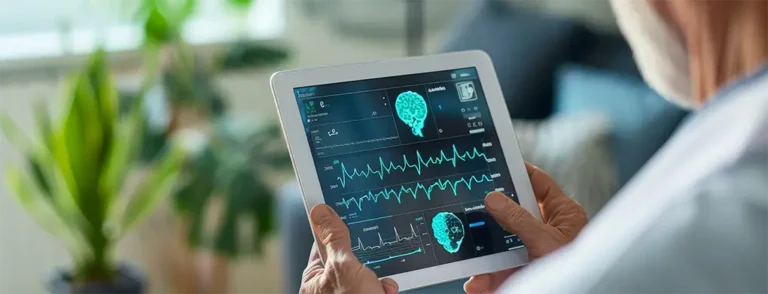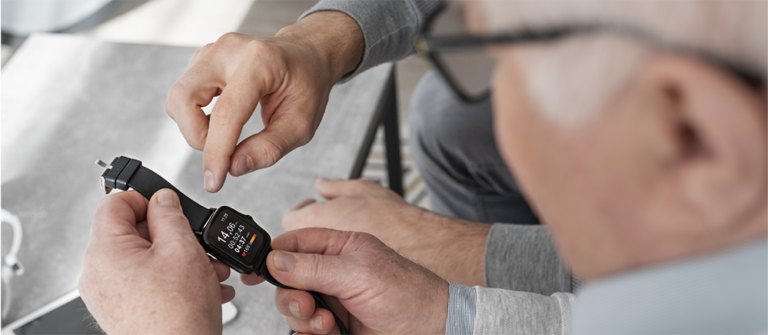
The medical alert sector rapidly evolves due to artificial intelligence (AI), machine learning (ML), and wearable technology breakthroughs. These developments are set to revolutionize our approach to health monitoring and emergency interventions, offering more tailored, preemptive, and accessible health management solutions.
Advanced Health Monitoring: The Cutting Edge of AI and Machine Learning
AI and ML are becoming increasingly essential in advancing medical alert systems, significantly improving their functionality and responsiveness. These technologies process extensive health data to identify patterns and predict potential health issues before they become urgent. For instance, AI’s capability to analyze continuous data streams allows for early detection of critical health indicators such as changes in heart rate variability, alterations in sleep quality, or fluctuations in physical activity levels, which could indicate emerging health problems.
Seamless Integration of Wearable Technology
Wearable technology has transitioned from a fitness accessory to a critical component of medical alert systems. These devices track more than just fitness; they monitor complex health metrics such as EKGs and blood oxygen levels. Enhanced by AI, these wearables can process health data in real time, providing vital alerts and insights promptly.
Devices like the Apple Watch exemplify the integration of such technology into daily life, capable of detecting falls and automatically initiating contact with emergency services, thereby showcasing the seamless merger of wearables into daily routines and critical health monitoring.
These innovations in wearable technology and AI are crucial in crafting more effective, personalized, and user-friendly medical alert systems. As these technologies evolve, they promise to deliver increasingly sophisticated solutions to improve user safety and quality of life. By embracing these advancements, the medical alert industry can significantly boost its offerings, ensuring users can access reliable, cutting-edge solutions that safeguard their health and well-being in our digital era.
Real-Time Data Processing for Enhanced Response Capabilities
Processing health data in real time is critical to modern medical alert systems. AI enhances this capability by enabling instant analysis and response. For example, suppose a wearable device detects an abnormal heart rhythm suggestive of atrial fibrillation. In that case, AI systems can immediately analyze the severity and, if necessary, alert healthcare providers or emergency services, potentially averting a medical crisis.
Predictive Health Insights and Preventative Care
Predictive analytics is another area where AI and ML are making significant inroads. These technologies can use historical health data to forecast future health events, allowing users and healthcare providers to take preventative action.
Enhancing User Experience with Natural Language Processing
As the interface technologies evolve, systems are becoming more interactive. AI-driven natural language processing (NLP) allows users to communicate with their medical alert systems through voice commands, making these systems more intuitive and accessible, especially for users with disabilities or those who are technologically averse.
Ethical and Privacy Considerations
While the benefits of AI and wearable technologies in medical alert systems are immense, they also raise significant ethical and privacy concerns. Handling sensitive health data requires robust security measures to prevent breaches and unauthorized access. Moreover, ensuring the accuracy and reliability of AI-driven decisions is crucial to maintaining trust in these technologies.
Future Directions: Ubiquitous Health Monitoring and Integrated Care
Integrating AI, ML, and wearable technology in medical alert systems will likely become more ubiquitous, providing a more integrated approach to health management. These systems could soon interact seamlessly with other home automation systems, providing holistic support to individuals, especially the elderly or those with chronic health issues.
For instance, imagine a scenario where a medical alert system not only notifies emergency services during a health crisis but also interacts with a smart home system to unlock doors for first responders and provide them with vital health information upon arrival.
Final Thoughts
The future of medical alert technology is bright, with AI, machine learning, and wearables driving innovations that promise to transform the landscape of personal health monitoring and emergency response systems. As these technologies evolve, they will provide more sophisticated, personalized, and preemptive healthcare solutions, significantly enhancing user safety and quality of life.
By staying informed about these trends and responsibly integrating these technologies, the medical alert industry can ensure that it remains at the cutting edge of healthcare innovation, providing invaluable services that users can trust and rely upon.
Sources:









